
Immortal Realms: Vampire Wars (PS4) - Review
by Jacob James , posted on 27 September 2020 / 3,812 ViewsNot all strategy games have to be so deep and complex that it takes multiple play sessions to fully comprehend them. Immortal Realms: Vampire Wars provides a compelling strategy game that combines turn-based combat and card-game elements into a straight-forward and easily digestible format. In this dark foreboding landscape all the tactical essentials are here, without the stress of lamenting the mistake you made at turn 268. Some minor issues hold it back at times, but overall newcomers and strategy enthusiasts alike will have plenty to sink their teeth into.
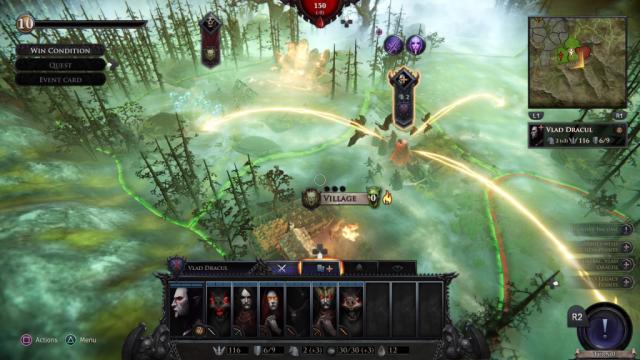
In the land of Warmont a storm is brewing between the Dracul clan and the lesser invaders to the realm. In Act one of the Dracul campaign you play as Lord Vlad, who seeks a peaceful reign with his wife Cecilia. The aggressors seek anything but peace, however, and vampire Vlad is quickly forced to change course. There are three campaigns to choose from: Dracul and his warrior clan; Nosfernus, who focusses on necromancy; and Moroia, who is magic-centric. Unfortunately, only Dracul is unlocked from the start; the other two can’t be accessed until completing the preceding one. That's kind of a bummer, as each have their own unique playstyle and set of cards to battle with, although unlocking them does make for a good incentive to keep playing.
Each campaign features four Acts of ascending difficulty, with defined restrictions and objectives that you have to stay within the confines of. If you’re looking to set your own parameters, there's both a skirmish and a sandbox mode, where you can choose from all three clans, set victory conditions, tweak AI settings, and so on.
The action of Immortal Realms: Vampire Wars is split between overworld map domination and turn-based combat with enemy forces. Both features play by the same rules as similar games in this genre and serve to break up the routine of eachother. While traversing the main map, blood is the currency you’ll be seeking via claiming villages, cities, and keeps, all while expanding your territory. That blood is used to maintain your troops while procuring new recruits and upgrading structures. Every four years (turns) you get to choose a new focus card for your clan, based on your immediate interests, whether that be cheaper unit costs, higher blood gain, increased clan exp, and so on. As you claim land and defeat foes your vampire lord levels up and gains Legacy points (trait tree). Perks here include: more passive blood gain, cheaper building upgrades, elite units, stronger ATK/DEF, and many, many more besides.
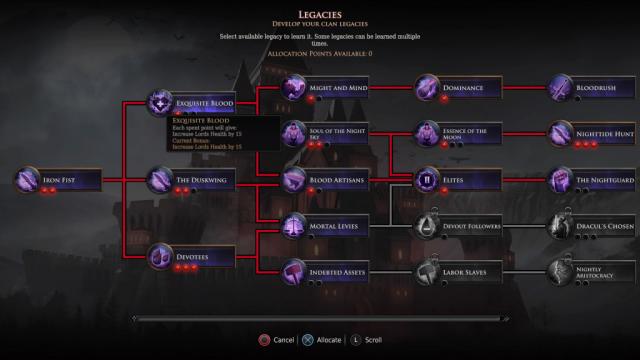
It’s Palindrome Interactive’s addition of a card system, though, that affords the interesting variety to gameplay. Cards can be used not only in your territory-claiming endeavors, but in battles as well. The overworld cards range from extra blood, to additional action points, or improving the veterancy of your troops, and more. Supplementary cards can be gained at libraries scattered around the map, and by regularly timed turn intervals. Deciding when and how to use these cards can be seriously advantageous. For example, I was grossly under matched against one opponent, and this was conveyed to me through the probable outcome message before battle of 'Certain Defeat'. After playing four ‘Ambush’ cards I had saved up, which deal random damage to several enemy units, the probable outcome had changed to 'Certain Victory!'.
Battle cards are different in that they are only accessed during combat, and aid in turning the tide of the encounter. Examples include: healing allies, bonus damage, shielding, and special attacks. These cards are pre-determined based on the vampire lord you're using, offering each lord a unique playstyle, and they can be upgraded. In a mechanic I greatly appreciated, upgrading a card offers you a choice between three variations that best fit your approach. One version may lower the magic cost to cast, while another will do increased damage but in a smaller range. Another still may offer a shorter cooldown or add an area-of-affect modifier. It’s a small feature, but one that adds choice and variety, so its value wasn’t lost on me.
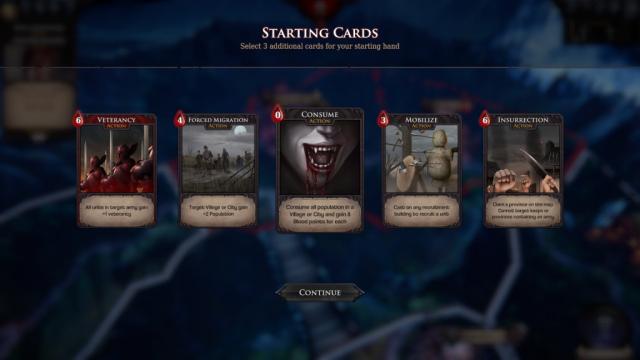
Before combat commences you'll be treated to a Battle Deployment window, which provides information like what units the enemy has, their level, and the probable outcome of the battle. These probable outcomes can range from 'Certain Defeat' to 'Certain Victory'. In an effort to save time on battles where you would clearly trounce your foe ('Certain Victory'), you're offered the option to auto-resolve. Auto-resolve skips the battle phase and usually ends up in very minor damage to a handful of your troops. If you try to auto resolve on a 'Likely Victory', though, you'll most likely lose a troop or two in the process, which means it isn't worth doing.
Don’t always assume that just because your probable outcome says 'Certain Defeat' that you need to reload a save and get stronger first (no one does that, right?). Many times, careful planning and strategic play on the battlefield can see you through to victory against such odds, even without losing a single ally! Sure, you’ll be battered and bruised, but healing a busted up veteran army unit is vastly preferable to starting a new recruit from scratch.
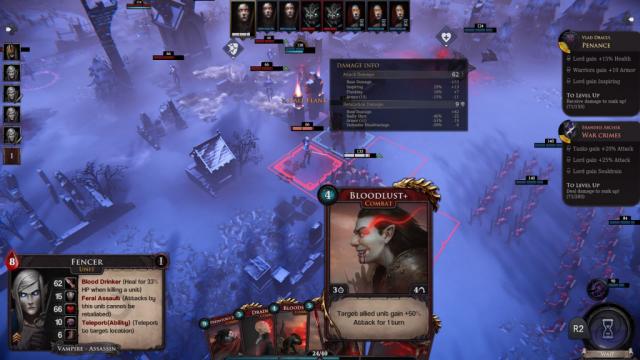
The combat portion of Immortal Realms: Vampire Wars works well enough, though I do have a few minor complaints, such as poor AI and one-liner VO repetition (“For The Dracul!”). Like any turn-based combat, players take turns setting up and launching attacks, and then watch them play out in real time. Keeping track of all this is the turn bar at the top of the screen. The indicator only displays eight character portraits at a time, though, so if you’re trying to see which unit will act on turn 9 you’re out of luck. Combat never really gets too difficult, however, so there's no real need for that much strategical forward planning.
More often than not, I found that sending my vampire lord into the thick of things worked out best every time. He would absorb the most hits and also hit the hardest. Between my one-man army (and my in-range archers doing solid work), I would have thinned the herd well enough to pull my lord back and send in the rest of the squad for safe clean-up. No deaths incurred… most of the time. That strategy doesn’t always work and is somewhat dependent on the map and enemy AI.
All of the maps are pretty cramped, and dealing with terrain obstacles factors heavily into how a match is fought. If you can block off paths with your troops then you can funnel the often lousy AI right into your lord and strongest allies. That or they’ll have to take the long way around to reach your archers and mages. This sometimes results in disappointing battles where the enemies will literally line up behind each other, waiting their turn to be slaughtered. Likewise, the close corridors of a map can leave a large portion of your own forces jumbled up, vying for position and unable to join the fight.
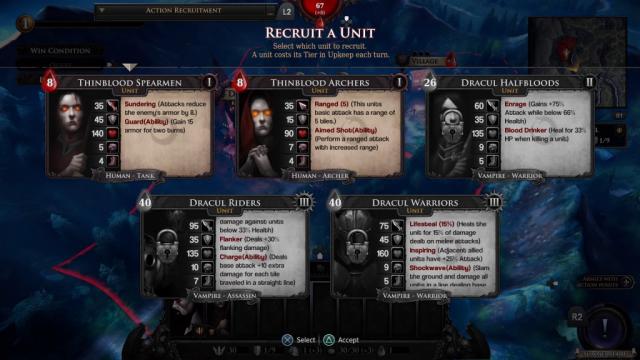
Immortal Realms: Vampire Wars controls pretty well for a console version. All movement and camera work is performed with the analog sticks. Cards are accessed with a press of the d-pad down, the Legacy tree with a press to the right, win conditions and special events with a press to the left, and empire management by pressing up. Sub-menu navigation and switching lords (when you're controlling multiple) is dealt with via L1 and R1, respectively, and you can end your turn with R2. Nothing beats a point and click mouse for strategy games, but I felt the controls here were handled well enough. Just be careful during battles, as you can sometimes move a character to an unwanted flank position with the analog stick and hasty confirmation.
I never really ran into any big issues with stability. My biggest complaint is exactly when the auto-save takes place. After you finish a battle you’re presented with the victory screen. Next you're treated to a rather lengthy load time before returning to the main overworld map. Immortal Realms: Vampire Wars doesn’t auto-save until you reach the overworld map. It was on the loading screen after a hard fought battle that a fatal error popped up and closed the game prior to saving. This only happened a handful of times, and really only cost about 20 minutes of playtime, but when you make every effort not to lose a single unit and defeat a taxing army… that loading screen can make for some annoying, high stakes tension! Oddly enough, this was the only screen that the game ever crashed on, for me at least.
Visually the atmospheres are evocative of the dark and moody vibe trying to be achieved, although sometimes the textures and resolution can look muddied. Perhaps this is why you can only zoom in so far on any given screen. Characters move with decent animations, but again it’s the cards that really shine. Each one has a unique and splendidly animated picture, from the blood dripping down the mouth of a vampire on the 'Consume' card, to the marching red plate-armored soldiers on the 'Veterancy' card. Thumbing through my hand of cards always felt like a pleasure.
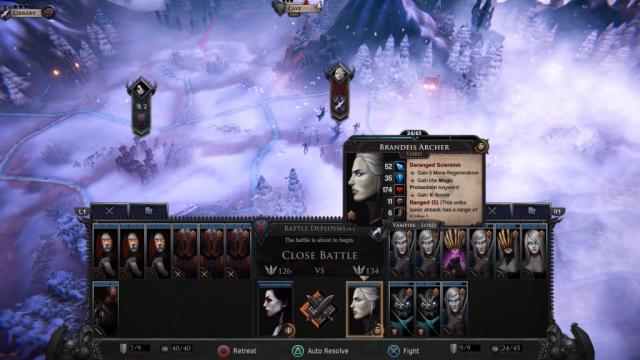
Immortal Realms: Vampire Wars is an accessible strategy game that both newcomers and veterans to the genre can enjoy. The streamlined systems remove some depth, but in return you get faster playthroughs, ensuring games aren't an enormous time sink. The AI and tight maps are disappointing at times, but the addition of the card system makes for a true high point that’s not common for the genre. With three separate clan campaigns and two additional play modes, there’s more than enough blood to go around.
Jacob James grew up in the golden era of 8- and 16-bit games, forever shaping and molding him as a life-long gamer. Some favorites include: Secret of Mana, Chrono Trigger, Final Fantasy and Super Mario RPG. Jacob graduated FullSail University with a degree in Computer Animation, so he has a working knowledge and understanding of what it takes to make these imaginative and immersive games he spends so much time playing and reviewing. You can follow him at www.LiveLootLevel.com
VGChartz Verdict
7
Good
This review is based on a digital copy of Immortal Realms: Vampire Wars for the PS4, provided by the publisher.
























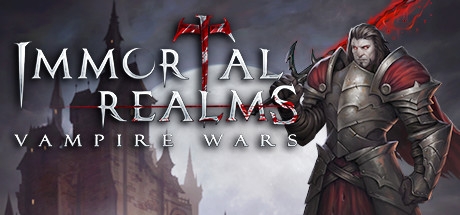



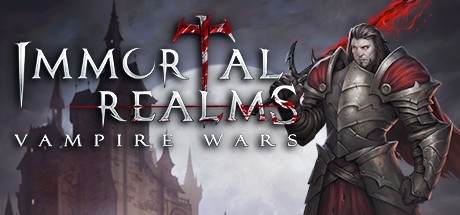

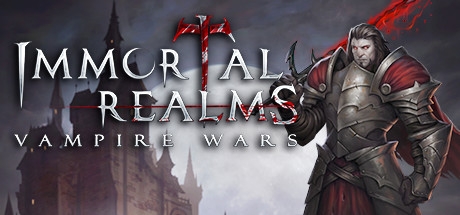

 Essay Pro
Essay Pro